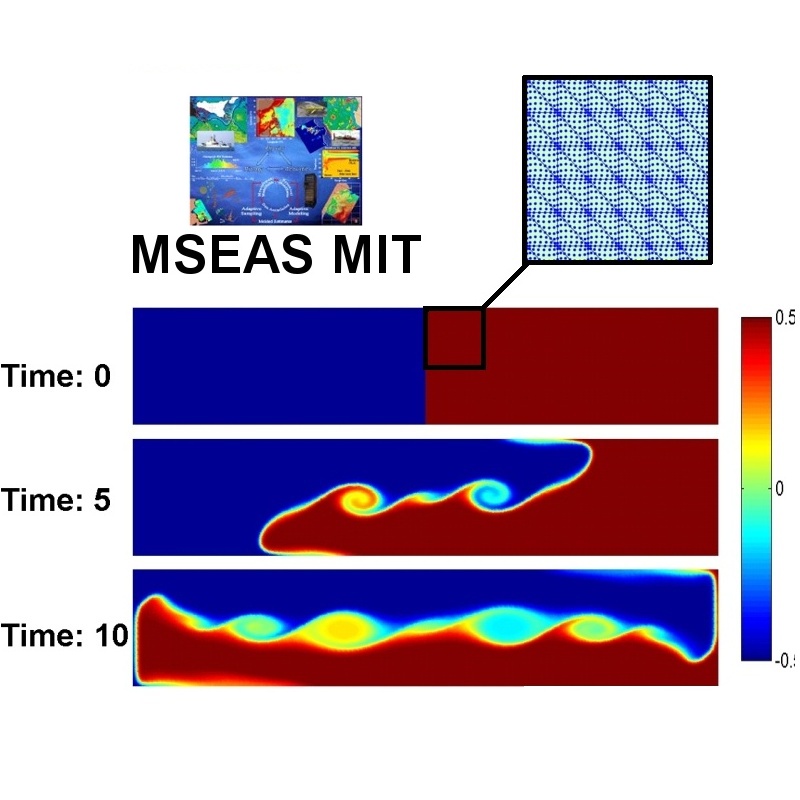IMUM2010 - 9th International workshop on Multiscale (Un)-structured mesh
numerical Modeling for coastal, shelf, and global ocean dynamics
Cambridge, MA, 17-20 August 2010Kirsch Auditorium at MIT's Ray and Maria Stata Center
This international workshop presents an annual opportunity for the developers and users of multiscale (un)-structured mesh models of physical and interdisciplinary ocean dynamics to exchange results and views related to all aspects of this field. The workshop is characterised by an informal and interactive style and by the high quality of the presentations and discussions at the leading edge of model development and ocean science and dynamics research.
This year, the IMUM2010 - 9th International workshop on Multiscale (Un)-structured mesh numerical Modeling for coastal, shelf, and global ocean dynamics will be held from Tuesday 17 August through Friday 20 August, 2010 at the Massachusetts Institute of Technology in Cambridge, MA, USA. The workshop will follow the following schedule:
- Tuesday (17 Aug) - workshop-discussions; ice breaker-reception
- Wednesday (18 Aug) - workshop-discussions; posters
- Thursday (19 Aug) - workshop-discussions; special event and dinner
- Friday (20 Aug) - workshop-discussions (half day)
Oral contributions and posters are expected to deal with all aspects of multiscale (un)-structured mesh numerical modeling of marine flows and dynamics, i.e. finite volume and finite element discretizations, high-order schemes, preconditioners, solvers, mesh generation, adaptive modeling, data assimilation, coupling with atmospheric or biogeochemical models, distributed computing, etc. Resorting to unstructured meshes makes it possible to resolve a wider range of scales of motion. Contributions on related approaches, in particular grid embedding and nesting systems, which pursue similar multiscale objectives, are also most welcome.
| Although many of today's marine modeling and data assimilation systems have evolved tremendously in complexity and realism since the late sixties and early seventies, it would be challenging to modify them step-by-step from a structured-grid approach to an unstructured-grid one. Similarly, modifying such complex codes from low-order, compact but numerically diffusive schemes to higher-order, less compact but numerically less diffusive schemes would also be challenging. Therefore, novel multiscale marine model design research is underway, paving the way for the second generation of ocean modeling systems. It is difficult to predict today if this new generation of ocean models will achieve its chief objective: widening the range of resolved scales of motion with increased efficiencies and accuracies, possibly allowing multi-resolution, multi-scale, and multi-dynamics numerical simulations of marine flows, all occurring seamlessly within distributed computing environments. In fact, hybrid approaches merging the advantages of structured and unstructured-grid modeling may be the way forward. |

|
Whether or not unstructured mesh schemes will prevail or be merged with structured mesh approaches is all the more difficult to predict now that structured mesh modelers have developed powerful solutions for increasing the resolution when and where needed. For instance, grid embedding is still a popular and useful method for enhancing model resolution. It can involve multiply nested domains and allows the relatively straightforward use of different dynamics or models in each domain. Research is also underway for developing multigrid, wavelet, and other multi-scale decompositions for the numerical solution of dynamical equations but also for the study of results, model evaluation or data assimilation. Powerful contributions related to all of the above research activities and directions are welcome at the workshop.
This workshop is partially sponsored by the Office of Naval Research. It is organized by the Multidisciplinary Simulation, Estimation, and Assimilation Systems (MSEAS) group at MIT. For additional information, contact members of the MSEAS group or pierrel at mit.edu or wgleslie at mit.edu.